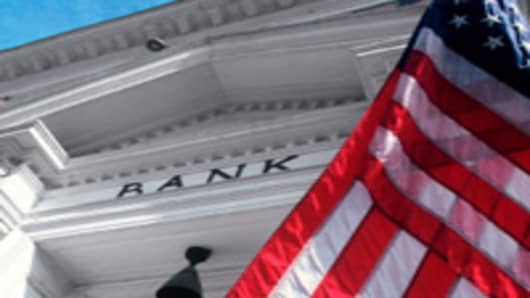They may be held in low esteem around the nation, but the country’s largest banks still wield considerable influence in Washington.
The banks have made it difficult for Congressional Democrats and the White House to give stretched homeowners a stronger hand in negotiating lower monthly payments on mortgages and to prevent credit card companies from imposing higher fees and interest rates.
CNBC Slideshows
Having won some early skirmishes by teaming with Republican allies, the banks now appear to have the upper hand and may wind up killing — or at least substantially diluting — both pro-consumer measures.
To turn the tide, Democrats are calling in their big gun — President Obama — to pressure the executives at the largest credit card lenders. In coming weeks, officials say, the administration intends to make a major push on consumer finance issues, possibly including tough new lending standards for homeowners seeking mortgages.
Mr. Obama is set to meet at the White House on Thursday with executives from American Express, Bank of America, Capital One Financial, Citigroup, Discover Financial Services, JPMorgan Chase and others to discuss what officials say are abusive credit card fees and practices.
During the presidential campaign, Mr. Obama made an issue of what he considered excessive credit card fees, but he has been largely silent on the matter since his arrival in Washington. As a candidate, he also favored legislation to make it easier for troubled homeowners to use bankruptcy court to ease the terms of their mortgages, a proposal he again endorsed last month.
Despite the president’s support and strong Democratic majorities in Congress, both proposals are in jeopardy because of lobbying by banks and their trade groups, particularly in the Senate.
On Wednesday, the House Financial Services Committee is expected to approve credit card legislation proposed by senior Democrats that would reduce many of the fees and limit the ability of the companies to charge penalties. The legislation puts into law most of the credit card restrictions adopted last year by the Federal Reserve, although the industry strongly opposes the bill because it says it believes a law would be harder to overturn than a regulation.
But the bill, sponsored by Representative Barney Frank, the Massachusetts Democrat who heads the Financial Services Committee, and Representative Carolyn B. Maloney, a New York Democrat, faces an uncertain future in the Senate. A tougher counterpart to the House bill was adopted on a narrow, party-line vote in the Senate banking committee three weeks ago. It has yet to find any Republican support, which would be necessary for it to survive.
The banking industry has also succeeded in working closely with Republicans to water down and then block a measure that would give bankruptcy judges greater authority to modify mortgages, including reducing principal payments. Senate Republican leaders say they have the support of all 41 of their members — enough to kill the provision by making it impossible to get the 60 votes necessary to cut off debate.
Senate Democrats, hoping to resolve the impasse, have opened negotiations in recent days, but not with their Republican counterparts. Instead, in an effort to divide the industry, the Democrats, led by Richard J. Durbin of Illinois, Charles E. Schumer of New York and Christopher J. Dodd of Connecticut, have been in talks with Bank of America, JPMorgan Chase and Wells Fargo, along with a group of credit unions. The lawmakers’ hope is that those institutions would exert pressure on Republican lawmakers and reluctant Democratic moderates.
Even if those negotiations are successful, the Democratic lawmakers are still likely to water down the bankruptcy bill further in the industry’s favor.
Before the negotiations, Citigroup had been the only major bank to support the bankruptcy measure, often referred to as “cram-down” legislation because it would give judges the authority to dictate terms to lenders and investors who own mortgages bundled into securities.
“The cram-down provision, if it became law, would raise the costs of all mortgages for everyone,” said Edward L. Yingling, president and chief executive of the American Bankers Association. “It’s a fact that if you undermine the value of the collateral by allowing cram-downs, you make the loans riskier and banks will price that risk accordingly by rates going up.”
Supporters of the bankruptcy measure had been planning to tie it to another banking bill that the industry favors.
That legislation would make permanent the temporary increase in deposits guaranteed by the Federal Deposit Insurance Corporation, to $250,000 from $100,000. It would also increase the F.D.I.C.’s credit line with the federal government to $100 billion, from $30 billion, thus enabling regulators to reduce a proposed special premium the banks will owe the F.D.I.C. later this year by more than 50 percent — a $7.7 billion savings.
But as the opposition to the cram-down provision has firmed in recent days, senators say there is a growing recognition that the bankruptcy measure might have to be detached and voted on separately. Democratic lawmakers have already agreed to the industry’s demand that the bankruptcy provision be unavailable to homeowners if a lender offers to modify a mortgage through the Treasury Department’s new foreclosure mitigation program. And over the objections of Ms. Maloney, a House subcommittee handed the industry a significant victory when it delayed the effective date by a year. Ms. Maloney said that she expected the measure to move swiftly though the House, but that it faced an uncertain future in the Senate unless it got some Republican votes.
“We need bipartisan support in the Senate,” she said. “We got 84 Republicans in the House on the same bill last year.”
Republican supporters of the industry have been helped in part by the decision by some Democratic campaign committees, fearful of voter reaction, to reject contributions from banks that have received bailout money.
Some prominent Democrats, including Nancy Pelosi, the House speaker, also are refusing donations from bank political action committees. Mr. Frank will not take money from employees of banks that received bailout funds.
Republicans “are never going to beat the Democrats in the fund-raising game in D.C. as long as they are the minority,” said Sam Geduldig, a lobbyist for several banking trade associations at Clark Lytle & Geduldig. “To the extent the Republicans can show they can impact policy, it causes professional donors and lobbyists to look at them in a different light, as opposed to when they just got bludgeoned” in the last election.



